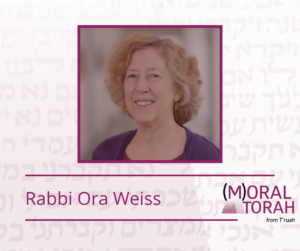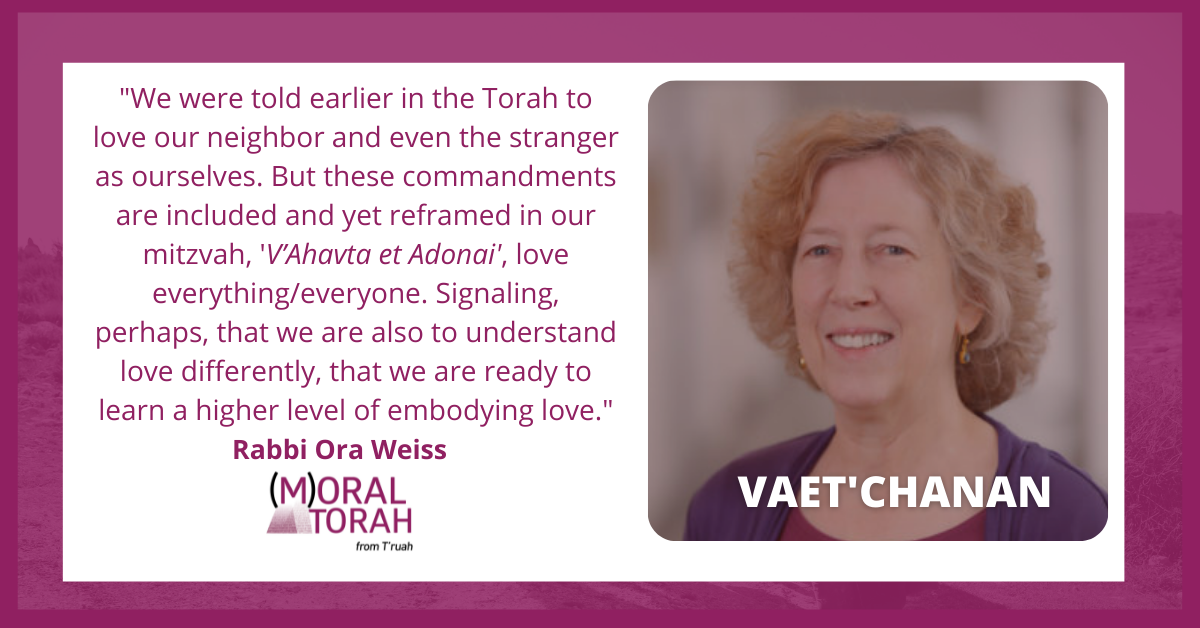A D’var Torah for Parshat VaEt’chanan by Rabbi Ora Weiss
When I was four years old, my mother took me on a bus from our suburban New Jersey neighborhood to go “downtown.” There, for the first time, I saw someone who was not white. In wonder, I cried out, ”Mommy, that lady is BROWN!” My mother shushed me and later explained that it wasn’t polite to talk about people, especially to point out shortcomings. I can’t remember the language she used, but it was clear that she was indicating she thought this person was somehow not as good as we were. But I was only amazed that here was someone whose skin was a beautiful brown color that I loved. The difference in our reactions? A judgment. Judgment is a pervasive yet insidious aspect of our lives. It is so often the initial seed from which it is but one or two steps to all kinds of discrimination and injustice.
In this week’s parshah, we are given the mitzvah that, understood at a deep level, could help turn this process around. “V’Ahavta et Adonai Elohekha.” “Love Adonai, your God.” (Deuteronomy 6:5). Adonai is a substitute for pronouncing the letters yud-heh-vav-heh, whose letters are a mash-up of tenses of the verb “to be,” which teaches us that God is “is-was-will be” — everything that is in the physical and non-physical realms. (See Art Green, Ehyeh, p. 2, 22). Thus, we are being told to love everything. And to love everyone. Because we, of course, are part of everything, the divine energy that is but clothed in these bodies, in different forms and vibrating at different frequencies. (See Rebbe Nahman of Breslov, Likutei Moharan, 64)
Sign up to receive (M)oral Torah in your inbox each week.
We were told earlier in the Torah to love our neighbor (Leviticus 19:18) and even the stranger (Leviticus 19:34) as ourselves. But these commandments are included and yet reframed in our mitzvah, “V’Ahavta et Adonai,” love everything/everyone. Signaling, perhaps, that we are also to understand love differently, that we are ready to learn a higher level of embodying love. That this mitzvah is extraordinary, signaling a great change in our relationship with the divine, was discussed by Rabbi Shalom Noach Berezovsky, the Slonimer Rebbe, a late 19th-early 20th century Chasidic master, in his Torah commentary, Netivot Shalom. He recounts that this mitzvah, to love God/everything, according to many sages and commentaries, is the essence and the point of the whole Torah. The Slonimer explains that we receive this mitzvah in the last book of the Torah, after 40 years in the wilderness, because it is only after our growth over time and through Torah that we are ready to understand and accomplish it. (Netivot Shalom on VaEt’chanan)
Humans see love as an emotion, or perhaps as kind, loving acts. Maybe we are now to understand love in the way in which God loves. God explains God’s loving ways in the 13 Attributes of Mercy (Exodus 34:6-7). These 13 divine attributes represent another kind of love, a way of being we humans might well be working toward attaining. (Note that 13 is the gematria, the numerical equivalent of the letters, of ahavah, the Hebrew word for love.) I have had a strong understanding for some time that the core of that higher love is not an emotion, but a state of being: non-judgment. An appreciation for everyone with no judgment of the person. When I have experienced this kind of love, it feels life-giving, life-sustaining, liberating.
This love is nothing other than holding space for each person to be themselves. For each to thrive, to grow, to make and to fix their mistakes, to be all that they came into this world to be. What a gift, this kind of love is!
Find more commentaries on Parshat VaEt’chanan.
Unlike emotional love, we can be told to achieve non-judgment. Here are some steps:
- Know you don’t know everything about a person. As H.W. Longfellow said, “If you knew the secret history of those you would like to punish, you would feel a sorrow and suffering enough to disarm all your hostility.” So, beyond your first impression, recognize you may be seeing the effects of childhood trauma, of teachings that skew their world view, or of karma that they are bound to live through.
- Realize that, despite how you feel, the person’s actions usually have nothing or little to do with you, but are their own internal process, their projection of their own faults.
- If someone is difficult for you, do as Rebbe Nachman recommends: find a point of good in them, focus on that. (Nachman, Likutei Moharan 11:17.)
 Finally, do all of this for yourself, too. If you are judging yourself, you will not have much success not judging others.
Finally, do all of this for yourself, too. If you are judging yourself, you will not have much success not judging others.
So this is the path, the way to begin to destroy the underlying foundation of injustice that lives within each of us. Do not judge. Hold the space. There is no greater kindness.
Rabbi Ora Weiss is teaching (on Zoom these days) and writing about levels of Torah that she is unearthing, that support greater balance, equality, consciousness, and love.

